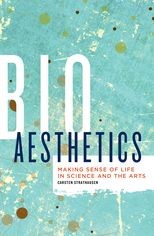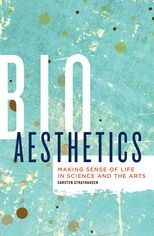Bioaesthetics: Making Sense of Life in Science and the Arts
Bioaesthetics: Making Sense of Life in Science and the Arts
Cite
Abstract
Bio-Aesthetics. A Critique examines the rising influence of evolutionary theory across academic disciplines today. Empowered by neo-Darwinian theory and recent advances in neuroscientific research, nascent academic fields have particularly challenged the Humanities’ non-empirical and largely speculative approach to modern art, culture, and aesthetic theory. In its stead, evolutionary scholars advocate a strict biological functionalism that effectively reduces mind to brain and art to science. Unfortunately, Humanities’ scholars so far have been slow to respond to this challenge. Bio-Aesthetics remedies this problem by providing the first comprehensive account of current evolutionary and neuroscientific approaches to art and human culture to demonstrate both the need for and the limits of interdisciplinary research in the Humanities. Above all, Bio-Aesthetics is A Critique in the Kantian sense of the term: it works through a critical appraisal of neo-Darwinian reductionism in order to develop a more germane and balanced methodology for future collaborative research across disciplines. Bio-Aestheticscentral argument contends that Kant’s transcendentalism amounts to the “structural coupling” of organism and environment, which also applies to our knowledge of the (phenomenological) world we come to inhabit as living beings. Scientific reductionism and neo-Darwinian theory ignore the self-constructed nature of reason and culture for genetic laws and evolutionary principles that allegedly determine human behaviour. Hence the overriding goal of Bio-Aesthetics is to provide the Humanities with a self-critical, historically nuanced and epistemologically up-to-date counter-paradigm to what E. O Wilson called “sociobiology,” that is the reductionist view of human cultural evolution dominant in neo-Darwinian evolutionary theory today.
Sign in
Personal account
- Sign in with email/username & password
- Get email alerts
- Save searches
- Purchase content
- Activate your purchase/trial code
Institutional access
-
Sign in through your institution
- Sign in with a library card Sign in with username/password Recommend to your librarian
Institutional account management
Sign in as administratorPurchase
Our books are available by subscription or purchase to libraries and institutions.
Purchasing information| Month: | Total Views: |
|---|---|
| November 2022 | 3 |
| November 2022 | 1 |
| November 2022 | 5 |
| November 2022 | 3 |
| November 2022 | 1 |
| November 2022 | 3 |
| November 2022 | 1 |
| January 2023 | 1 |
| February 2023 | 1 |
| April 2023 | 1 |
| April 2023 | 4 |
| May 2023 | 1 |
| May 2023 | 1 |
| October 2023 | 2 |




Get help with access
Institutional access
Access to content on Oxford Academic is often provided through institutional subscriptions and purchases. If you are a member of an institution with an active account, you may be able to access content in one of the following ways:
IP based access
Typically, access is provided across an institutional network to a range of IP addresses. This authentication occurs automatically, and it is not possible to sign out of an IP authenticated account.
Sign in through your institution
Choose this option to get remote access when outside your institution. Shibboleth/Open Athens technology is used to provide single sign-on between your institution’s website and Oxford Academic.
If your institution is not listed or you cannot sign in to your institution’s website, please contact your librarian or administrator.
Sign in with a library card
Enter your library card number to sign in. If you cannot sign in, please contact your librarian.
Society Members
Society member access to a journal is achieved in one of the following ways:
Sign in through society site
Many societies offer single sign-on between the society website and Oxford Academic. If you see ‘Sign in through society site’ in the sign in pane within a journal:
If you do not have a society account or have forgotten your username or password, please contact your society.
Sign in using a personal account
Some societies use Oxford Academic personal accounts to provide access to their members. See below.
Personal account
A personal account can be used to get email alerts, save searches, purchase content, and activate subscriptions.
Some societies use Oxford Academic personal accounts to provide access to their members.
Viewing your signed in accounts
Click the account icon in the top right to:
Signed in but can't access content
Oxford Academic is home to a wide variety of products. The institutional subscription may not cover the content that you are trying to access. If you believe you should have access to that content, please contact your librarian.
Institutional account management
For librarians and administrators, your personal account also provides access to institutional account management. Here you will find options to view and activate subscriptions, manage institutional settings and access options, access usage statistics, and more.